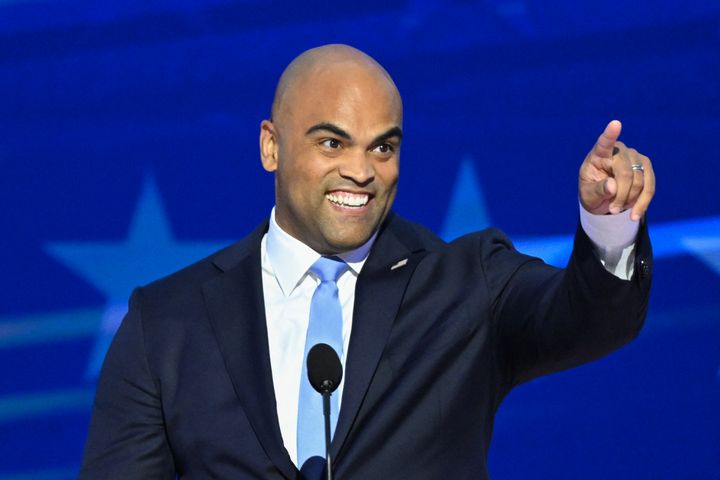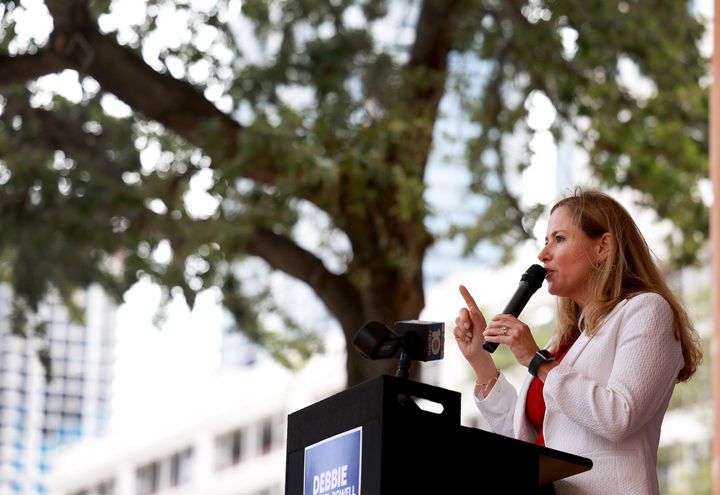
CHICAGO ― Senate Majority Leader Chuck Schumer stood on stage at the Democratic National Convention and made a very bold prediction.
“We’re going to hold the Senate again, and we’re poised to pick up seats,” he told the delegates in the United Center.
The fact Schumer feels confident in his prediction reflects the remarkable strength of most Democratic incumbents in swing states. But it also flies in the face of a tough reality for Democrats: Even if they win every swing state race, it might not be enough to get them control of the U.S. Senate.
To keep the word “majority” in Schumer’s title, Democrats will need to win at least one of three states where Republican nominee Donald Trump is a significant favorite in November: Texas, Florida or Montana. Each of the three states presents distinct challenges for the party, and it’s difficult to describe them as favored in any of the three.
It’s the culmination of a long-standing problem for the party: The Senate’s bias toward rural states advantages the GOP’s political coalition, forcing Democrats to repeatedly pitch the political equivalent of perfect games to stay in control of Congress’ upper chamber.
Republicans clearly believe the social conservatism of those voters will be more than enough for them to flip the Senate, with a win in West Virginia essentially guaranteed following the retirement of Sen. Joe Manchin (I-W. Va.). Democrats currently have a 50-49 edge in the chamber.
“Securing the border is top of mind for voters, and Senate Democrats are delusional if they think they’re going to win with candidates like Colin Allred, Debbie Mucarsel-Powell and Sen. Jon Tester, who have long records of opposing border security,” said Torunn Sinclair, the communications director for Senate Leadership Fund, a super PAC controlled by allies of Senate Minority Leader Mitch McConnell.
In Montana, Democrats have the advantage of incumbency, but it might not be enough for Sen. Jon Tester (D-Mont.) to overcome a challenge from Republican Tim Sheehy. In Texas and Florida, Democrats are running against unpopular GOP incumbents Ted Cruz and Rick Scott, but are also on long-standing statewide losing streaks.
Ultimately, Democrats are betting polls showing them with a shot at winning these states will matter more than decades of decline in the number of voters who are splitting their tickets.
“We all know the history of ticket-splitting in Senate races,” said one national Democratic strategist, who requested anonymity to speak frankly about the party’s position. “But we can’t ignore what voters are telling us ― they view Senate races and the presidential race very differently.”
Lakshya Jain, co-founder of the election analysis firm Split Ticket, said their election forecast model gives Democrats slightly better odds of flipping Texas, and booting Sen. Ted Cruz, than of saving Tester.
“I think Democrats, if they have to pick one, weirdly enough, they have better chances of winning Texas in the Senate race than they do Montana,” Jain said. “I don’t think people realize how difficult that’s going to be for Jon Tester this time around.”
Split Ticket’s model, factoring things like polls, campaign spending and historical incumbency advantages, gives Republicans an 84% chance of winning the two seats they need to flip control of the Senate.
The stakes are high. Without control of the Senate, it could be difficult for a theoretical Harris administration to confirm its cabinet officials, never mind judges. Campaign goals like codifying Roe v. Wade or passing the child tax credit would go by the wayside, and gridlock would likely be the norm.
Beyond this red-leaning trio of states, there are other possible wrinkles in the Senate map. Republicans, who have well-funded candidates in Pennsylvania and Michigan, could manage to triumph in one of the presidential swing states, or former Maryland Gov. Larry Hogan could pull off a shocking upset in deep blue territory. There’s also been polling showing an independent candidate, union activist Dan Obsorn, within striking distance of Sen. Deborah Fischer (R-Neb.).
But when it comes to brass tacks, these will be the ones to watch.
Big Sky Survival
Tester is one of the ultimate political survivors, winning three terms by razor-thin margins even as Montana became significantly more Republican during the Trump era. He’s done it by emphasizing his willingness to work with Republicans and his essential Montana-ness, symbolized by the missing fingers he lost to a meat grinder.
“I only care about Montana, and that’s why I worked with Donald Trump to pass over 20 bills,” Tester says in a new ad. “And stood up to Biden to cut spending and secure the border.”
But two public polls released this month showing him down to Sheehy sparked concerns among Democrats, even though a third public poll showed him leading the race. Montana, which is far from the major presidential and House battlegrounds, is rarely polled, making operatives and political junkies eager to slurp up each drop of new information about the contest.
Democrats say their internal polling still shows the race as a toss-up, and have tried to steadily chip away at Sheehy’s biography with stories questioning his honesty, business acumen and ties to the state. At the same time, they’ve rolled out a Republicans for Tester coalition including a former governor, a former state GOP chair and even a sitting state senator. Polls continue to show Tester running ahead of Harris by large margins ― 14 percentage points in one poll.
“Jon Tester is no stranger to tough races,” said Monica Robinson, a spokeswoman for Tester. “He’s won three in a row because he has a strong coalition of support across the state, including independent voters and Republicans. Jon’s strong record of defending Montana is why Montana Republicans from across the state ― from elected officials to business owners to Trump voters ― are supporting Jon in his campaign for Senate.”
Republicans, meanwhile, are simply counting on political gravity to bring Tester down and believe that Sheehy ― a former NAVY Seal who’s raised about $15 million for his campaign ― is a good enough candidate to avoid disaster.
Lone Star Surge

If Tester is giving Democrats a degree of worry, Rep. Colin Allred’s campaign in Texas is giving them a tinge of hope. Allred has claimed momentum after a $1 million surge of donations following his speech at the Democratic National Convention, and two polls in a week showing him trailing within the margin of error.
Swapping out Harris for Biden has clearly aided Allred, since she’s doing much better with Black and Latino voters, who make up 12% and 39% of Texas’ electorate respectively.
“The enthusiasm and grassroots energy for Congressman Allred’s campaign is through the roof,” Allred campaign manager Paige Hutchinson said. “We are thrilled by this outpouring of support, and it builds off of Allred’s work to criss-cross the state, meet Texans where they are and build a campaign to win.”
Allred’s not ahead in any polls, but Hutchinson pointed to several surveys that showed Cruz with a lead of only three or four percentage points, meaning Allred is within the margin of error. A poll released Friday showed Cruz leading Allred by a slim margin of 46.6% to 44.5% and another on Tuesday also had Cruz ahead by just 2 points.
Allred defeated a more progressive Democrat, state Sen. Roland Gutierrez, and has campaigned as a moderate while leaning on his biography as a former NFL linebacker, civil rights attorney and the son of a single mother. A TV ad released this week hits Cruz for having suggested raising the Social Security retirement age ― an extremely conventional Democratic criticism of any Republican. Over the weekend, the Allred campaign hosted a “Women for Allred” campaign focused on protecting abortion rights.
Texas is pretty red. Donald Trump beat Joe Biden there by nearly six percentage points in 2020, though Biden cut the margin almost in half compared to Trump’s 2016 victory. And two years earlier, Cruz narrowly defeated Democratic challenger Beto O’Rourke by just 2.6 percentage points in a race that received national attention.
The memories of the O’Rourke race are, in some ways, haunting Allred. One national Democratic operative, requesting anonymity to speak candidly, said Allred was running as the “anti-Beto,” placing far less emphasis on hitting every small county in the state and more emphasis on getting up with television ads introducing himself and hitting Cruz.
This approach has led some Democrats to publicly worry about the pace of Allred’s campaign.
One thing O’Rouke and Allred do have in common: They’ve used their races against Cruz to bring in oodles of small-dollar donor money. Allred has raised more than $38 million for his campaign, and has more than $10 million on hand.
The Year Of The Florida Woman?

Democrats, at the moment, have the least faith in Florida, though the upside of the state remains high. Harris is more likely to win it than either Texas or Montana, according to FiveThirtyEight, and Democrats in the state are also optimistic about the passage of an abortion rights amendment to the state constitution.
The biggest barrier, however, may be cash. While the Democratic nominee, Rep. Debbie Mucarsel-Powell, has raised a healthy amount for her campaign, bringing in more than $14 million, Florida is a notoriously expensive state to campaign in, and the incumbent, GOP Sen. Rick Scott, is unafraid to spend tens of millions of dollars of his personal fortune to win races.
On a conference call Tuesday, Mucarsel-Powell touted herself as the only Latina running for Senate in the U.S. and adopted the “freedom” frame the Kamala Harris campaign has used for its economic agenda.
“We are not going to allow frauds like Rick Scott rob our freedoms away, our economic security and the opportunities for our children, because that’s exactly what he intends to do if he gets back to the Senate.”
Mucarsel-Powell said Scott wrote “the preamble to Project 2025,” namely an 11-point plan to “rescue America” that Scott released in 2022. The document included such unappetizing proposals like higher income taxes on the poor and an automatic sunsetting of all federal laws, including those authorizing Medicare and Social Security. (Scott has since edited the plan significantly.)
Polling has shown Mucarsel-Powell within the margin of error even though she’s yet to air television ads, but Republicans are confident their gains among Latino voters in South Florida make the math for a Democratic victory impossible.
“We’re taking this race seriously,” said Chris Hartline, a spokesman for Scott. “Sen. Scott has visited all 67 Florida counties since the start of his campaign and is traveling to communities across the state talking to voters, in English and Spanish, about the issues that matter to them. Meanwhile Debbie barely leaves Miami because she’s desperately trying to hold onto votes in what she wrongly considers her base of support. Miami rejected her once and Florida will reject her this time around because she’s made the gross miscalculation that Floridians want a Socialist as a U.S. Senator.”
Florida Democratic Party chair Nikki Fried said that since the Democratic National Convention last week, Florida Democrats have recruited 13,000 volunteers, bringing their statewide total to 40,000.
“This is an army,” she said. “Vice President Kamala Harris and Gov. Tim Walz have not just reenergized the base in Florida, they have expanded it. They have created a momentum shift unlike anywhere else in the country.”
Disclaimer: The copyright of this article belongs to the original author. Reposting this article is solely for the purpose of information dissemination and does not constitute any investment advice. If there is any infringement, please contact us immediately. We will make corrections or deletions as necessary. Thank you.
